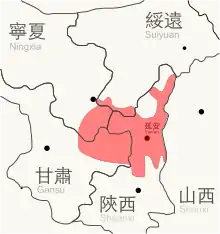Shaan-Gan-Ning Border Region
Shaan–Gan–Ning Border Region (traditional Chinese: 陝甘寧邊區; simplified Chinese: 陕甘宁边区; pinyin: Shǎn-Gān-Níng Biānqū; lit. 'Shaan-Gan-Ning Border Region'), or in postal romanization Shen–Kan–Ning, commonly known by its historical sources as the Yan'an Soviet[1] was a historical proto-state that was formed in 1937 by the Chinese Communist Party following the collapse of the Chinese Soviet Republic in agreement with the Kuomintang as a part of the Second United Front policy, substituting the former anti-Kuomintang Soviets.[2] It existed until 1950.
| Shaan-Gan-Ning Border Region 陝甘寧邊區 | |||||||||
|---|---|---|---|---|---|---|---|---|---|
| Border Region of China Rump state of the Chinese Soviet Republic | |||||||||
| 1937–1950 | |||||||||
 Map of Shaan-Gan-Ning Border Region. | |||||||||
| Capital | Yan'an (1937–47, 1948-49) Xi'an (1949–50) | ||||||||
| Area | |||||||||
• 1937 | 134,500 km2 (51,900 sq mi) | ||||||||
| Population | |||||||||
• 1937 | 1,500,000 | ||||||||
| History | |||||||||
| Government | |||||||||
| Chairman | |||||||||
• 1937–1948 | Lin Boqu | ||||||||
| Deputy Chairman | |||||||||
• 1937–1938 | Zhang Guotao | ||||||||
• 1938–1945 | Gao Zili | ||||||||
| Historical era | Chinese Civil War | ||||||||
• Established | 6 September 1937 | ||||||||
• Disestablished | 19 January 1950 | ||||||||
| |||||||||
| Today part of | China | ||||||||
It served as the headquarters base area[3]: 632 and was one of the two border region governments with the capital at Yan'an, named after the provinces of Shaanxi, Gansu, and Ningxia with some parts incorporated from Suiyuan province which is now part of Inner Mongolia. Later, the second region that was created was known as the Jin-Cha-Ji Border Area. It is lesser known because the name refers to the old geographic realities, which were Shanxi, Chahar, and Hebei, respectively.
Although not on the front lines of the Chinese War of Resistance against Japan, the Shaan-Gan-Ning Border Region was the most politically important and influential Base Area due to its function as the de facto capital of the Communist movement.[4]: 129
References
- "The Yan'an Soviet". 18 September 2019.
- Saich, Tony; Van De Ven, Hans J. (2015-03-04). "The Blooming Poppy under the Red Sun: The Yan'an Way and the Opium Trade". New Perspectives on the Chinese Revolution (0 ed.). Routledge. pp. 263–297. doi:10.4324/9781315702124. ISBN 978-1-317-46391-7. OCLC 904437646.
- Van Slyke, Lyman (1986). "The Chinese Communist movement during the Sino-Japanese War 1937–1945". In Fairbank, John K.; Feuerwerker, Albert (eds.). Republican China 1912–1949, Part 2. The Cambridge History of China. Vol. 13. Cambridge University Press. pp. 609–722. doi:10.1017/CHOL9780521243384.013. ISBN 9781139054805.
- Opper, Marc (2020). People's Wars in China, Malaya, and Vietnam. Ann Arbor: University of Michigan Press. doi:10.3998/mpub.11413902. ISBN 978-0-472-90125-8. JSTOR 10.3998/mpub.11413902.